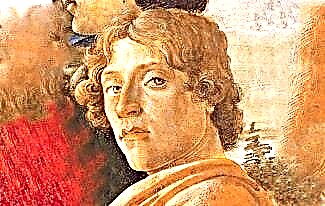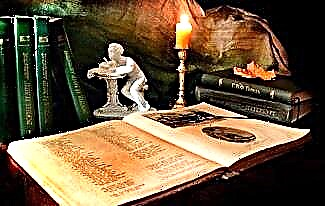Plutarch, full name Mestrius Plutarch - an ancient Greek writer and philosopher, a public figure of the Roman era. He is best known as the author of the work "Comparative Biographies", which described the images of famous political figures of Ancient Greece and Rome.
Plutarch's biography contains many interesting facts from his personal and public life.
So, here is a short biography of Plutarch.

Plutarch's biography
Plutarch was born in 46 in the village of Heronia (Roman Empire). He grew up and was raised in a wealthy family.
More about the early years of Plutarch's life historians do not know anything.
Childhood and youth
As a child, Plutarch, together with his brother Lamprius, studied various books, receiving a fairly good education in Athens. In his youth, Plutarch studied philosophy, mathematics and rhetoric. He mainly learned philosophy from the words of the Platonist Ammonius.
Over time, Plutarch, along with his brother Ammonius, visited Delphi. This trip played a big role in the biography of the future writer. She seriously influenced his personal and literary life (see interesting facts about literature).
Over time, Plutarch entered the civil service. During his life, he held more than one public office.
Philosophy and Literature
Plutarch taught his sons to read and write with his own hand, and also often arranged youth meetings in the house. He formed a kind of private academy, acting as a mentor and lecturer.

The thinker considered himself to be the followers of Plato. However, in reality, he rather adhered to eclecticism - a way of constructing a philosophical system by combining various provisions borrowed from other philosophical schools.
Even during his studies, Plutarch met the peripatetics - students of Aristotle, and the Stoics. Later he sharply criticized the teachings of the Stoics and Epicureans (see Epicurus).
The philosopher often traveled the world. Thanks to this, he managed to get closer to the Roman Neopythagoreans.
Plutarch's literary heritage is truly enormous. He penned about 210 works, most of which have survived to this day.
The most popular were "Comparative Biographies" and the cycle "Morals", consisting of 78 works. In the first work, the author presented 22 paired biographies of prominent Greeks and Romans.
The book contained the biographies of Julius Caesar, Pericles, Alexander the Great, Cicero, Artaxerxes, Pompey, Solon and many others. The writer selected pairs on the basis of the similarity of the characters and activities of certain individuals.

The cycle "Morals", authored by Plutarch, carried not only an educational, but also an educational function. He talked with readers about talkativeness, timidity, wisdom, and other aspects. Also, in the work, attention was paid to raising children.
Plutarch also did not bypass the politics, which enjoyed great popularity among both the Greeks and the Romans.
He talked about politics in such works as "Instruction on State Affairs" and "On Monarchy, Democracy and Oligarchy."
Later, Plutarch was awarded Roman citizenship, and also received a public office. However, soon serious changes took place in the biography of the philosopher.
When Titus Flavius Domitian came to power, freedom of speech began to be oppressed in the state. As a result, Plutarch was forced to return to Chaeronea in order not to be sentenced to death for his views and statements.
The writer visited all major Greek cities, making many important observations and collecting a large amount of material.
This allowed Plutarch to publish such works as "On Isis and Osiris", which outlined his understanding of ancient Egyptian mythology, as well as a 2-volume edition - "Greek Questions" and "Roman Questions".

These works analyzed the history of two great powers, two biographies of Alexander the Great and a number of other works.
We know about Plato's philosophical ideas thanks to such books as "Platonic Questions", "On the Contradictions of the Stoics", "Table Talks", "On the Decline of the Oracles" and many others.
Personal life
We don't know much about Plutarch's family. He was married to Timoksen. The couple had four sons and one daughter. At the same time, the daughter and one of the sons died in early childhood.
Seeing how his wife yearns for the lost children, he wrote especially for her the essay "Consolation to the Wife", which has survived to this day.

Death
The exact date of Plutarch's death is unknown. It is generally accepted that he died in 127. If this is true, then in this way he lived for 81 years.
Plutarch died in his hometown of Chaeronea, but he was buried in Delphi - according to his will. A monument was erected on the sage's grave, which archaeologists discovered in 1877, during excavations.
A crater on the Moon and an asteroid 6615 are named after Plutarch.









